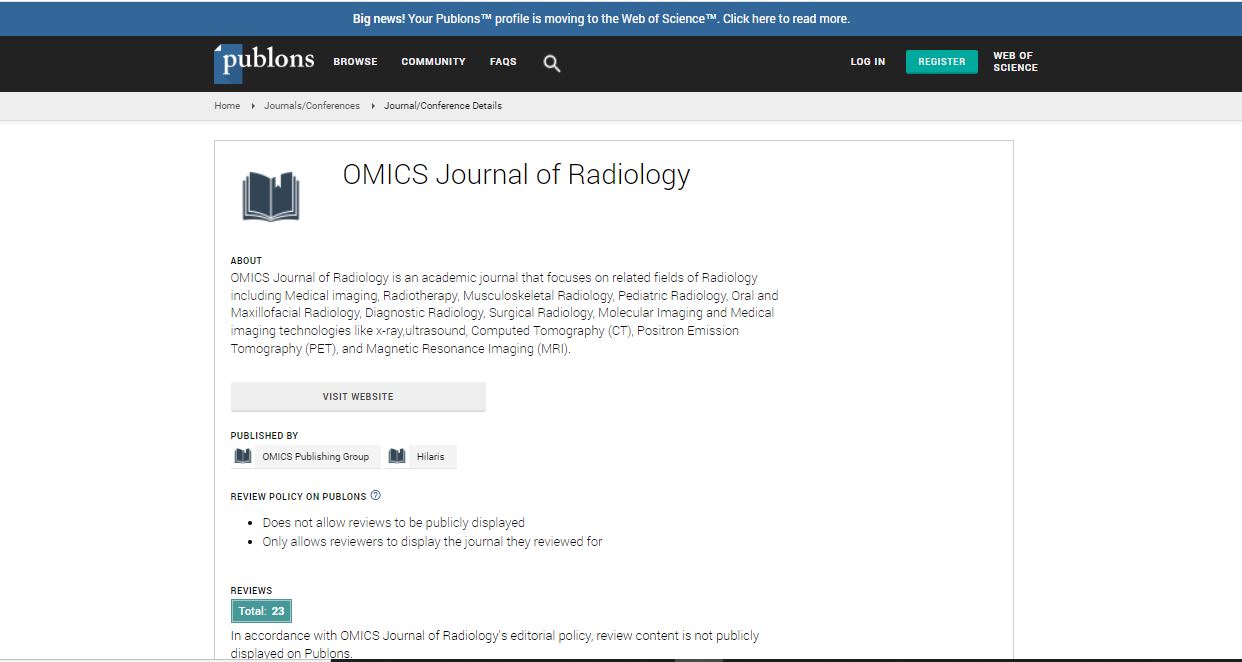Our Group organises 3000+ Global Conferenceseries Events every year across USA, Europe & Asia with support from 1000 more scientific Societies and Publishes 700+ Open Access Journals which contains over 50000 eminent personalities, reputed scientists as editorial board members.
Open Access Journals gaining more Readers and Citations
700 Journals and 15,000,000 Readers Each Journal is getting 25,000+ Readers
Google Scholar citation report
Citations : 551
Journal of Radiology received 551 citations as per Google Scholar report
Journal of Radiology peer review process verified at publons
Indexed In
- Index Copernicus
- Google Scholar
- Open J Gate
- Genamics JournalSeek
- ResearchBible
- Electronic Journals Library
- RefSeek
- Hamdard University
- EBSCO A-Z
- OCLC- WorldCat
- SWB online catalog
- Virtual Library of Biology (vifabio)
- Publons
- Geneva Foundation for Medical Education and Research
- ICMJE
Useful Links
Share This Page
Atorvastatin attenuate radiation-induced small intestine damage through downregulation of inflammationrelated molecules
World Congress on Radiology and Oncology
Ching-Hsueh Cheng, Ming-Feng Wei, and Sung-Hsin Kuo
National Taiwan University Hospital, Taiwan National Taiwan University College of Medicine, Taiwan
Posters & Accepted Abstracts: OMICS J Radiol
Abstract
Considering that the underlying characteristics of rapid cell turnover of small intestine epithelial cells, radiotherapy often resulted in small intestine injury, such as apoptosis of epithelium and shortening of villi, when radiotherapy was used for treating abdominal or pelvic cancer. Atorvastatin, a 3-hydroxy-3-methylglutaryl coenzyme A reductase inhibitor, is widely used in the clinic for decreasing serum cholesterol. In addition, atorvastatin has many biological effects, including improvements of endothelial function, and reductions of oxidative stress and inflammation. To avoid radiation-induced enteritis, we sought to investigate whether atorvastatin can attenuate radiation-induced early and delayed damage of small intestine. In the present study, C57BL/6 mice were divided into 4 groups: Control; Atorvastatin alone: 30 mg/kg atorvastatin was administered once daily for 5 days; Irradiation (IR) alone: radiation at a dose of 5 Gy was administered once daily for 3 days (abdomen cavity) and Atorvastatin+IR: radiation of 5 Gy was administered once daily for 3 days following administration of atorvastatin for 5 days. The results of the hematology (white blood cells, platelet, and hemoglobin) and biochemical tests (albumin, alanine aminotransferase, creatinine, and lactic dehydrogenase) showed that atorvastatin didn├ó┬?┬?t induce significant difference in mice with IR and Atorvastatin+IR groups. The value of Chiu├ó┬?┬?s injury score and crypt/villi (C/V) ratio were used to assess mucosa damage level, and the results showed that administration of atorvastatin decreased the damage level of atorvastatin+IR group (Chiu├ó┬?┬?s score: 0.67├?┬▒0.58; C/V ratio: 0.50├?┬▒0.07) when compared with IR alone group (Chiu├ó┬?┬?s score: 3.67├?┬▒0.58; C/V ratio: 1.11├?┬▒0.14). Furthermore, the activation of IR-induced apoptosis-associated caspase 3 was also reduced after pretreatment of atorvastatin. Furthermore, atorvastatin down-regulated the mRNA levels of inflammatory molecules, including IL-1├?┬▒, IL-6, MMP9, NF-├?┬║B, Pin1, and TGF-├?┬▓1 and the levels of fibrosis factor, including collage I and III. In conclusion, atorvastatin can decrease the level of apoptosis, inflammation, and fibrogenesis of small intestine tissue after abdominal radiotherapy.Biography
Ching-Hsueh Cheng has received his BS degree in Medical Imaging and Radiological Sciences at Chung Shan Medical University, Taichung, Taiwan (ROC). He has received his MS degree in Anatomy and Cell Biology from National Taiwan University of Medicine, Taipei, Taiwan in 2012. He has served as a Radiation Technician at Division of Radiation Oncology, Department of Oncology, National Taiwan University Hospital, Taipei, Taiwan, since Aug 2012. His work contents included pre-treatment simulation, linear accelerator (Varian and Elekta) operation, and Tomotherapy. His research focused on the research of combined radiation oncology with cell conduction and signaling

 Spanish
Spanish  Chinese
Chinese  Russian
Russian  German
German  French
French  Japanese
Japanese  Portuguese
Portuguese  Hindi
Hindi 
